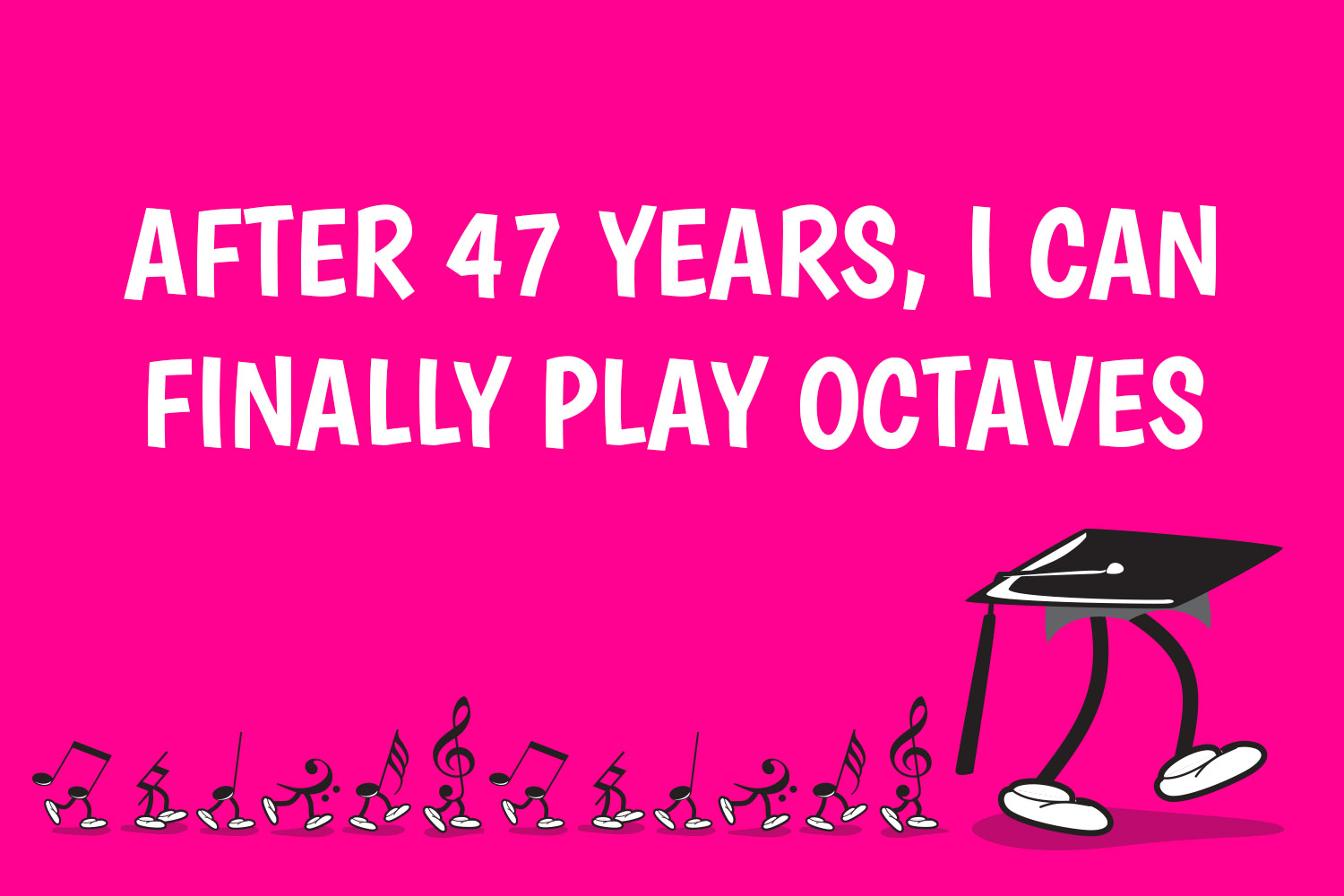After 47 Years, I Can Finally Play Octaves

Last week, I learned how to play the piano.
This may sound strange, as my bio clearly states that I’ve been playing piano for 47 years.
However, it wasn’t until I attended the Taubman symposium at UC Berkeley, and immersed myself for five days in lectures, lessons and practice, that I really understood how piano technique actually works, and more importantly, how it works for ME.
Here is a little bit of background about my piano tuition:
Ages 3-5: general exposure to piano; learned a little by rote from my grandmothers and my dad.
Ages 5-12: formal lessons with local Russian piano teacher; all went very well and I never seemed to have trouble playing any of the intermediate repertoire. I was a reasonable pianist for my age when I auditioned for the Conservatorium High School.
Ages 12-17: Learned advanced repertoire. Passed A.Mus and L.Mus (Australian examination board diploma levels) with distinction. Stayed away from the really crashy showy stuff as passage work seemed easier for me.
Ages 17-22: From Year 11 until I finished my B.Mus performance degree, my new teacher gave me the really crashy showy stuff to practice. Can’t play octaves? Learn Chopin’s octave etude, that’ll fix ya!1 Worried about big chords? Do Franck’s Prelude, Chorale and Fugue!2 And how about the Liszt Eb concerto for your final recital? What a great way to overcome that fear of octaves!3
Ages 22-present 4: Had the odd lesson here and there. Tried Alexander Technique, Feldenkrais, physiotherapy for the shoulder tension. I regularly perform at nursing homes but have never really increased the volume or difficultly of my repertoire. In general, I tend to play piano only in association with teaching or accompanying.
Right, so that’s my piano history; now back to last week’s amazing week on the Taubman approach.
I should probably clarify that the symposium wasn’t my first experience of Taubman.5 I first heard Therese Milanovic talk about it at the 2015 APPC in Melbourne. I then started to read her articles, and had a lesson with her when she came to Sydney. She asked me what I had trouble with. My list went as follows:
- Couldn’t play double octaves (or any octave passages with either hand, actually) without tightness and/or pain in forearms
- Trills weren’t great: uneven and uncontrolled
- Stiff shoulders/shoulder pain sometimes
- Generally couldn’t tackle big chords or highly virtuosic passages of music
Therese immediately saw that my posture was all wrong. I was sitting too low, I was holding my arms out, my wrists were down… the list goes on. Geez, was this hard to fix! Now I know what woodwind and brass players go through when they have to change their embouchure. Whilst it was rather painstaking, once I got used to my new posture I definitely felt a little more in control.
Over the last four years I’ve had sporadic lessons with all three certified instructors in Australia. In 2017 I attended Brenda Hunting and Anthony van den Broek’s two-day Taubman conference, after which I wrote the blog ‘No Pain, No Gain: The Biggest Myth of Piano Practice’. In the past six months I’ve had more regular lessons with Anthony and have watched the Golandsky Institute DVDs.
My technique had definitely improved, but octaves and big chord passages were still elusive, mostly because I wasn’t really practising enough to apply the principles I was learning. So the big breakthrough came last week.
The symposium is basically a week of nerding out on piano technique and piano practice. When I opened up my welcome pack at the orientation meeting on the Sunday night, I was delighted to see a packed, personalised schedule, which consisted of:
- Three private lessons with John Bloomfield. This is equivalent to being allocated to Steve Smith in your first visit to the junior cricket academy.6
- Three ‘supervised practice’ sessions with a Practice Assistant (PA). My PA was none other than my teacher in Sydney, Anthony! So this ended up being like have additional lessons.
- Five practice sessions, one each day.
- Two hours of lectures and one masterclass each day. Normally I would baulk at having to sit through this… but boy, it was fantastic!
- Two technique clinics in the week, which are like shared private lessons where you can ask any questions about technique you like.
- Access to practice rooms from 6pm-10pm each night.
By the end of the week, I could play octaves with ease. Let me just say that again. I COULD PLAY OCTAVES WITH EASE. I cannot tell you how exciting it was to be able to play a cascading double octave passage and not feel pain or tension.7 I could also manage fast chord passages and I understood how to keep my technique feeling free. I had also done more practice in five days than in the entire year leading up to it: and the big difference was that I was ENJOYING practising.
I won’t go into the details of all the technical points I learned. Suffice to say that if you immerse yourself in the details of Taubman, and take the time and trouble to learn from the experts, you can emerge from all playing-related pain and tension and open yourself up to a new era of enjoyment.
I rang my mum on the last day, and said ‘Mum, I feel like I can actually play the piano now’. She of course already knew about the previous 47 years, so this was confusing for her. But if you are a pianist reading this, and you’ve ever felt that your technique was less than you desired, I absolutely recommend giving this method a go. For me, it has been transformational, and I now cannot wait to get back to piano practice.
- Could barely manage it.
- Nope.
- This performance, like all the practice sessions leading up to it, was miserably inaccurate, as well as painful to execute. I barely passed.
- Turning 50 at the end of September, yay!
- There was one woman who actually did turn up with no prior experience. It was a tad overwhelming for her. BUT, she came away realising that it was possible to play without pain, and it was very emotional for all of us to see Edna Golandsky work with her at the piano.
- For non-Aussie readers: equivalent to getting Babe Ruth on little league camp.
- At one stage, I simply stopped and burst into happy tears.

Wow Sam, that’s really good to hear!! 😚
Thank you Erica. It is quite life-changing!
I am so glad you had a good experience in Berkeley. I remember speaking about this with you at NCKP, where we met. My only regret: not seeing you while you were in the San Francisco Bay area because I live in Oakland. Next time you’re around, give me a buzz! Would love to hear more about this sometime
Oh thank you Omri! I did not know you lived there. Having said that, there was ZERO time for anything but what was on the schedule, and I flew out 5 hours after the last lecture! Will definitely get in touch next time I am over there. 🙂
I’m so incredibly happy for you, Sam. Congratulations and enjoy every minute of being able to play comfortably!
Thank you Diane! I am very happy. Rach G min prelude here I come 🙂
Sam, you should send this to the Golandsky Institute, I think they would love to hear your testimonial x
ooh, ok, how exactly do I do that?
I would go to the website, http://www.golandskyinstitute.org; Contact Us at the bottom. I’m also playing free octaves for the first time and wouldn’t have believed it if I hadn’t experienced it myself!
How wonderful Helen!
The e-addresses of all the faculty who were at Berkeley are on the list of names and addresses that was given to us there.
How good is the other side!! Go Sam!
The balance between effort and ease in playing is actually something we can manage!!
I can’t wait to get to Symposium.
It is amazing, I can’t wait to experience it with you!
You’ve inspired me Samantha and I beat you in n age ! : we shared the same first Russian piano teacher
Oh my gosh this is so true!!! I had forgotten!!!
So glad to see this post and happy for you. Your NCKP presentations were so well done, I couldn’t imagine you having any difficulties at all. I’m looking forward to reading your other posts. My piano time has been spent in education and accompanying as well, and yes, my skills are limited.
Thank you Linda!
This is a fantastic read! I think I need this now than ever.
How do I register for the next edition of the symposium?
Hi Joseph, go to http://www.golandskyinstitute.org/ and you will find info there. Best to keep a lookout – it is always run in July or August. Thanks for the feedback!
So glad to hear you got so much out of it Sam. Taubman truly is life-changing work!
This is so exciting and inspirational, Samantha. Thank you so much for sharing your journey with us!
Thank you so much Christine!
Fantastic result for you, and so inspiring! Thanks for this great testimonial, Samantha. My interest in Taubman (& what it could do for me too) increases along with your octave ability…. 🙂
Thanks Tania! Check out the videos on the Golandsky institute website, they are very inspiring too!
Samantha, I too had tried different techniques over the years, to try minimising back, shoulder and neck pain. Playing in bands and busking has meant bad posture and trying so hard to play well in spite of it. Watching my students I had come to a few conclusions about my own lessons as a kid. I have encouraged a more natural, relaxed posture but didn’t know what else to do. I try doing exercises to strengthen those problem areas but have found reading these articles exciting, including to help me. Been meaning to read this for ages, thanks.
Thank you Karen! Good look with addressing the pain, that’s tough.
WOW That is truly life changing!!! Octaves are really hard!!😀